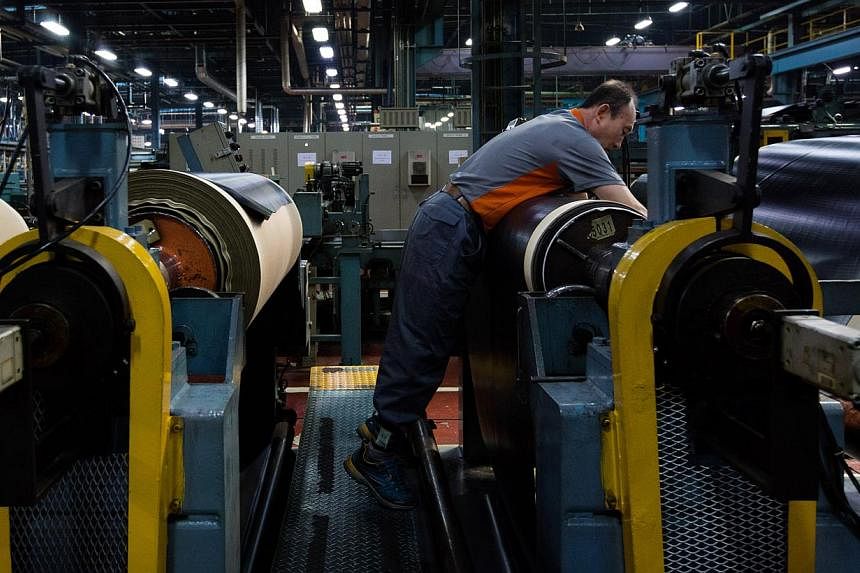ANSAN, South Korea (REUTERS) - South Korea's Puretech, a small supplier of mobile phone components, has a workforce increasingly made up of ageing baby boomers.
The company in Ansan, an industrial city near Seoul, finds older workers useful in marketing, advisory roles, and in quality control.
The work scene is a reflection of the demographics of South Korea, which like Japan, is rapidly aging.
South Korea's legion of older workers has helped keep the jobless rate low but has exacerbated record low employment among the young - less than half of those aged 15 to 29 have jobs.
It is also a cause of the decade-long stagnation in wage growth, dampening consumption.
Kim Yeon-soon, 55, joined the company last year and leads a dozen workers who manually check final components bound for tech firms such as Samsung Electronics.
She retrained for production work after various jobs, including social work.
"This is a new type of work, but I thought working at a different job would be fun and I am now enjoying the work."
Given high household debt and a poor welfare system, older employees such as Kim are willing to adapt to keep working.
"Elderly people are so aggressive and desperate in seeking employment after losing jobs that they are willing to take low-wage jobs even at factories that young people avoid," said Park Chang-in, head of the Korea Labour Foundation's job transfer service team.
As wages stagnate, households spend less. Consumption is lagging overall growth despite government efforts to ease the US$1.4 trillion (S$1.9 trillion) economy's reliance on exports.
Household spending as a percentage of gross domestic product has been declining since 2006, though domestic consumption has increasingly fuelled neighbouring economies.
South Korea has added more than three million jobs in the past 10 years, keeping unemployment at an average of 3.5 per cent for the decade through 2013, lowest among Organisation for Economic Co-operation and Development (OECD) countries and less than half the 7.1 per cent OECD average.
However, real wage growth averages less than 1 per cent a year over the past decade even as the economy averaged brisk 3.7 per cent growth after adjusting for inflation.
"Strong employment growth used to be a result of strong economic growth but in recent years, job growth has been led by a strong supply of labour, especially of the elderly," said Kang Joong-koo, an economist at LG Economic Research Institute.
'GROWTH WITHOUT WAGES'
The trend is deepening, with wage growth falling to a real 0.6 per cent last year from 2.5 per cent in 2013 and the employment rate of those aged 50 or older rising to 55.5 per cent from 54.8 per cent.
At the same time, the employment rate for those aged 15 to 29 fell to 41 per cent in 2014 from 45 per cent a decade ago as more young people opted to stay in school for longer or gave up looking for jobs.
A recent OECD report showed South Korean men stop working at an average age of 71.1, the oldest after Mexico among the organisation's 34 member countries and more than 10 years later than the country's official retirement age - meaning many older people are actively in the job market.
South Korea is the fastest ageing country among the world's major economies and expects its working-age population to start shrinking in 2017.
Last year, the Korea Labour Foundation helped about 15,600 mostly elderly people find new jobs after losing their previous jobs, well past its target of 11,000.
"Well-paying jobs that elderly people used to occupy are getting scarcer and elderly people are accepting positions even for very low wages," said Park Jong-kyu, an economist at the Korea Institute of Finance, calling this a"growth-without-wages" pattern.
While companies such as Samsung Electronics and Hyundai Motor helped turn South Korea into an industrial powerhouse, they now create more jobs in lower-wage countries than at home.
Samsung Electronics froze domestic wages this year after profits fell in 2014.
The flipside of low wage growth is that companies such as Puretech can glean the benefits of cheap labour for now.
"It's beneficial to both the workers and the company as they can remain in their careers while we were able to hire experienced staff at relatively low cost," said Puretech managing director Chen Jung-pil.

